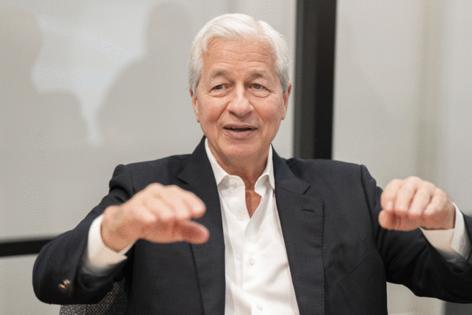JPMorgan Chase's Jamie Dimon talks tariffs and the possibility of a recession
Published in Business News
The day President Donald Trump’s sweeping new taxes on U.S. imports took effect last month, JPMorgan Chase & Co. CEO Jamie Dimon told a television interviewer that a recession was “likely.”
Hours later, Trump announced a 90-day pause on some of the steepest tariffs he’d announced just a week earlier on what he dubbed “Liberation Day” — a policy that prompted turmoil in financial markets.
Speaking to reporters, the president said he had observed market volatility — and also had watched Dimon’s interview on Fox Business.
Dimon, the chief executive of the biggest U.S. bank, is closely watched not just on Wall Street but also in Washington, D.C., for his economic insights.
So now, three weeks after Trump hit the brakes on a trade agenda he said would usher in an “economic revolution,” does Dimon still think a recession may come soon?
“I think what I said is that our economists think it’s likely. … And it’s probably still true,” Dimon said in an interview Thursday in Philadelphia, where he was scheduled to receive an award for business leadership from the Franklin Institute.
“Inflation will be a little higher. Growth will be a little slower. We’ve actually seen a little bit of that,” he said. The Trump administration “did back off, but it still has a lot of other ongoing effects.”
Ahead of the award ceremony, Dimon sat down with The Inquirer and the Philadelphia Business Journal at JPMorgan’s branch on Broad and Walnut Streets, which opened a few months ago at the site of a former Wawa.
It’s one of dozens of branches the bank has opened in the region since the late 2010s, betting that physical locations can still be profitable even as many customers have turned to online banking.
Dimon discussed Trump’s trade talks, Congress’ tax agenda, cuts to scientific research, and his company’s back-to-office policy. Here are highlights from the interview, which has been edited for length and clarity.
Q: What do you think the Trump administration should prioritize in its trade negotiations with other countries?
A: The goal should be, at the end of the day, take Europe and the U.K. to finish these agreements. If there’s unfair trade, fix it. But the goal should be to help them be strong and help them stay close to us. Keep the Western world, the free and democratic nations — the EU, the U.K., Australia, Korea, Philippines, Japan — close and strong.
Q: The GOP-led Congress is discussing extending the 2017 Trump tax cuts, parts of which are set to expire at the end of the year. What should Congress prioritize in the new tax bill?
A: It (the corporate tax cut) did bring a lot of capital back, a lot of jobs back, a lot more investment here. … The worst thing to me is to not grow the economy and have any taxes that drive capital and innovation and people overseas. It’s a bad tax strategy. If you want to tax, you should tax incomes, which isn’t going to stop you from growing or expanding. So the first is to maintain it. … And then maintain what they call the extenders, the R&D tax credits, the investment credits and stuff like that. They have a whole bunch of other stuff on the table. I have no idea what’s going to happen to that.
Q: Institutions in Philly like the University of Pennsylvania are concerned about the Trump administration’s cuts to scientific research . You’ve said such research is important. Why? And do you think the administration will dial that back?
A: If you look at the history of America, the R&D that took place was in companies and in universities and some of the governments. The government’s got fabulous labs. … But a lot of it was done … in universities. … I think [the cuts are] a mistake, and I’m hoping they’ll dial it back. I think they’ve been told by a lot of people that [the cuts] probably can hurt America. That R&D drove a lot of success.
Q: Earlier this year you required JPMorgan employees on hybrid schedules to return to the office five days a week . Has there been a lot of churn?
A: We’re not here for the employee; we’re here for the customer. And if it hurts younger people, is that fair? And if it hurts the company for innovation and growth and speed, is that right? …
There’s been no turnover. People are going back to work. There were complaints about the first day in certain sites — not enough parking, their cafeteria’s overcrowded. Well, I’m like, OK, get over it. I mean, it’s OK. …
I completely understand if someone else wants a work-from-home company. They will lose in the marketplace. The other thing is, we have 10% working from home. Always have, permanently. So I’m not against working from home. I’m against working at home when it doesn’t work for the company, the clients. And so we did it by job type. So, no, we’ve had no real pushback, no pushback, no attrition. I think we’re a great place to work.
©2025 The Philadelphia Inquirer, LLC. Visit at inquirer.com. Distributed by Tribune Content Agency, LLC.












Comments